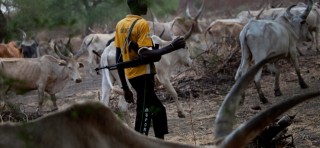Recent dealings of Fulani herdsmen in southwest Nigeria have raised issues on whether or not the nomads should remain within the southwestern geo-political zone of the country. This is hinged on the alleged fresh attack of the latter on Chief Olu Falae’s farm, barely two weeks after the herdsmen abducted him and remanded him for four days until the ransome for his life was paid.
In view of the recent vandalism, Yoruba leaders, the Afenifere, convened in an emergency summit where it was decided that a red card be given to the nomads. The summit entitled “National Insecurity and the Menace of Fulani Herdsmen in Yorubaland” came up with a communique, which demanded the immediate arrest and trial of the culprits. “Failure to adhere may lead to a breakdown of law and order,” they said.
While it may seem too frontal for the Afenifere to make such demands, past atrocities committed by the Fulani herdsmen apparently strengthen the order. Early this month, it was reported that a border town of Oja-Odan in Yewa North Local Government Area of Ogun State, Nigeria was invaded by some of the nomads killing a farmer and injuring dozen others. The farmer was said to have been killed because he complained against the invasion of his farm by the cattle rearers.
In the same area, a mother of three was reportedly raped and hacked to death by suspected Fulani herdsmen on her farm. Similarly, an account was given of a newly married woman who was raped by armed Fulani nomads. Fueling the rage of the residents was the fact that the state security service did not do anything about the matter.
The Afenifere’s request for government intervention is logical, however, is it likely that the government will actually intervene in the aged feud between the two conflicting communities? Chief Ayo Adebanjo, leader of the Afenifere, opined that if nothing is done, the Fulani nomads will become too powerful and continue oppressing the Yoruba people. Some have even suggested that the Fulani herdsmen are becoming greater terrorists than Boko Haram.
Even though the cause of the Yoruba leaders seems justifiable, Chief Adebanjo’s threat of secession illuminates a certain helplessness perhaps more than an empty resolve. The statement, “we will not fold our arms,” made by the group showed they were prepared for the consequences of their threats.
However, the two communities are interconnected. For example, the south needs agricultural goods from the north such as groundnut, milk, shea butter and meat. Meanwhile, the Federal Government is yet to release a statement concerning the issue, implying that any resolution to this dispute is likely to be reactive rather than proactive.








